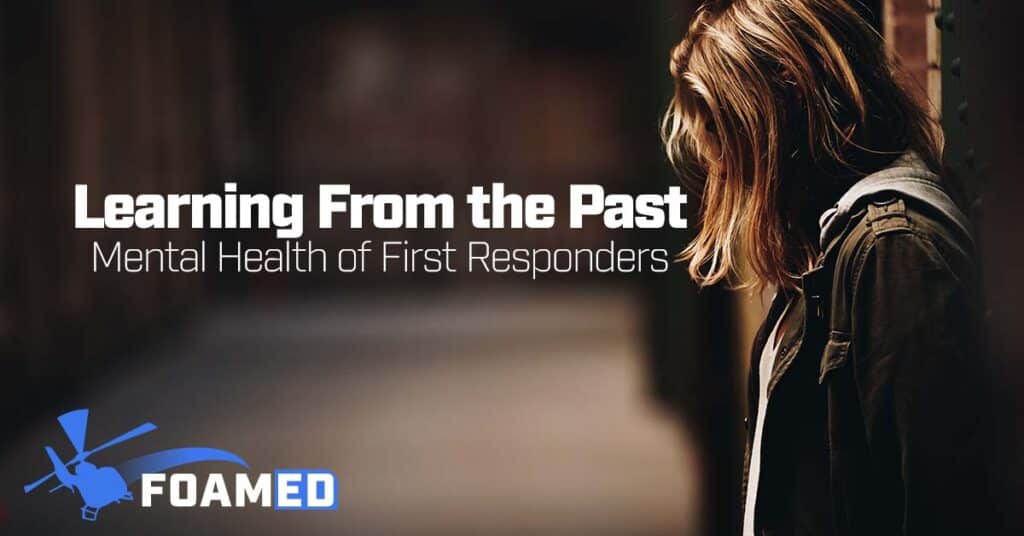Learning From the Past

September 11, 2001, and the Mental Health of First Responders
The tragic events of September 11, 2001, have left an indelible mark on the world’s collective memory. The devastating terrorist attacks on the World Trade Center and the Pentagon resulted in the loss of thousands of innocent lives and left countless others traumatized. While the immediate aftermath of the attacks focused on the physical destruction and loss of life, the long-term psychological impact on first responders and medical professionals has been profound.
First responders, including firefighters, police officers, paramedics, and medical professionals, were at the forefront of the rescue and recovery efforts on 9/11. They displayed unparalleled bravery and dedication, risking their lives to save others. Some lost their lives as they saved others; however, the traumatic experiences encountered by those who survived during and after the attacks have had lasting effects on their mental health and that’s what I want to talk about today. Your mental health is important and it’s important to “brush your brain” as much as you brush your teeth.
The Mental Health Impact on Medical Professionals
Medical professionals, especially those involved in pre-hospital and critical care transport medicine, play a crucial role in emergency situations. They are trained to provide immediate medical assistance to victims and transport them to medical facilities for further care. However, the nature of their job exposes them to traumatic events, which can take a toll on their mental well-being.
I want to introduce you to a FlightBridgeED family member. James Boomhower, a Critical Care Transport Specialist-Paramedic with over 15 years of experience in EMS, has actively brought mental health awareness to the EMS arena. He works with Boston Medflight of Bedford, Massachusetts, and is a Crisis and Peer supporter for the ECHO FAST and the state of RI CISM teams. James founded the Stay Fit for Duty platform in 2018 to recognize the importance of mental health for EMS providers. The platform aims to provide resources and training to healthcare providers and first responders, promoting physical and emotional wellness.
Stay Fit 4 Duty: A Beacon of Hope
Stay Fit 4 Duty emphasizes the importance of mental health for medical professionals. The platform’s goals include:
- Providing Resources: Advocating for better mental health and resilience education and practice in the medical profession.
- Training: Helping teams create peer support programs within their institutions to ensure medical professionals have a support system.
- Connecting: Aligning individuals with members of the mental health profession who understand the unique challenges medical professionals face.
The platform also offers training for medical professionals to treat their mental health with the same dedication as they treat the physical health of their patients. By combining the power of peer support and psychological first aid with culturally informed mental health professionals, Stay Fit 4 Duty aims to provide the best mental health care possible for those in the medical field.
Why Does Mental Health Matter? …Especially for EMS professionals like yourself…
Mental health is as crucial as physical health, and its significance cannot be overstated. Here’s why:
- Overall Well-being: Mental health affects our thinking, feeling, and acting. It plays a vital role in handling stress, making choices, and relating to others. A sound mental state ensures a balanced life full of purpose and meaning.
- Physical Health: Poor mental health can lead to physical health problems. Stress, for instance, can lead to heart disease, high blood pressure, and even obesity.
- Productivity and Performance: Mental well-being enhances productivity and performance in personal and professional spheres. It ensures better decision-making, effective problem-solving, and coping with challenging situations.
- Relationships: Good mental health fosters better relationships. It helps in understanding one’s emotions and the emotions of others, leading to better interpersonal relationships.
- Resilience: Sound mental health equips individuals to bounce back from adversity. It provides the strength to face challenges head-on and recover from setbacks.
- Quality of Life: Mental well-being ensures a better quality of life. It promotes positive self-esteem, self-confidence, and a clearer understanding of oneself and the world.
The events of September 11, 2001, have had a profound impact on the mental health of first responders and medical professionals. The trauma of that day, combined with the everyday challenges of their profession, underscores the need for comprehensive mental health support. Platforms like Stay Fit 4 Duty are leading the way in ensuring that these brave individuals receive the care and support they deserve. Prioritizing mental health is not just essential for personal well-being but is crucial for the overall health and prosperity of communities and nations.
The Significance of Anniversary Dates and Mental Health
Anniversary dates, especially traumatic events, can evoke a myriad of emotions and memories. These dates can act as powerful triggers, bringing back intense feelings, thoughts, and even physical sensations experienced during the original event. For many, the anticipation of the anniversary can be as distressing as the day itself. It’s essential to recognize and validate these feelings, understanding that they are a natural part of the healing process. As we approach such dates, it’s crucial to prioritize mental well-being, seeking support when needed, and employing coping strategies that have proven effective in the past. It’s important to take care of yourself so you can take care of others. September 11 is just one example of such a thing, but there may be more in your own life. From all of us at FlightBridgeED, and Stay Fit 4 Duty, we are here for you. If you need help please reach out and we will help you. Below is the website address for Stay Fit 4 Duty as well as a helpful infographic about anniversary dates and mental health. Take a look and pass it along. Better tomorrows for our patients start with better tomorrows for ourselves!
